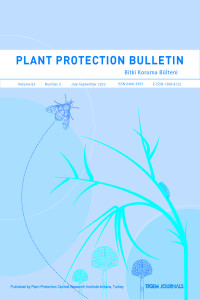Research Article
Aim & Scope
The Plant Protection Bulletin has been published by the Plant Protection Central Research Institute since 1952. The Bulletin is published four times a year with original research articles in English or Turkish languages on plant protection and health. In addition, two invited review articles could be published annually in the Plant Protection Bulletin.
Bulletin includes research on biological, ecological, physiological, epidemiological, taxonomic studies and methods of protection in the field of disease, pest and weed and natural enemies that cause damage in plant and plant products. In addition, studies on residue, toxicology, and formulations of plant protection products and plant protection machinery are also included.
The article evaluation process is based on double-blind referee system and published as open access. Annual biological studies, short communication, and first report don’t publish in the Bulletin. Two invited review articles could be published annualy in the Plant Protection Bulletin.
Author Guidelines
Submitted articles in the Plant Protection Bulletin should be prepared in accordance with the "Manuscript template". The layout of the accepted articles is done by our journal.
Ethical Principles and Publication Policy
Ethical Responsibilities of Authors
1. The manuscript should not be published elsewhere or submitted to more than one journal for simultaneous consideration.
2. The manuscript should be original works in accordance with the purpose and scope of the journal.
3. The authors are required to make a full and correct reference to other studies.
4. The manuscript submitted for publication should not be contrary to the ethics of scientific publications (plagiarism, falsification, distortion, republishing, slicing, unfair authorship etc.). The publisher has the right to reject and/or retract the manuscript in case of any ethical violation, even it was previously accepted. The authors are not able to object to the decision made by the journal.
5. All authors must disclose any actual or potential conflict of interest.
6. Authors have to be prepared to share raw data assessed in the manuscript and any related information if so requested by the editorial board within the framework of the evaluation process.
7. Authors whose names appear on the submission have contributed sufficiently to the scientific work and therefore share public responsibility for all the results.
8. Any changes to authorship during the publication process must be approved by all authors of the paper, and these approval decisions must be sent to the journal. In addition, the reasons behind the change in authorship must be explained to the journal. Changes of authorship or in the order of authors are not accepted after acceptance of a manuscript.
9. Authors should fully declare all sources of funding received for the research submitted to the Journal.
Ethical Responsibilities of Editors
1. All manuscripts are judged based on the intellectual contents, regardless of gender, race, ethnicity, religion, citizenship or political values of the authors.
2. Editors are responsible for making decisions based on the contribution of the article submitted to the journal to researchers and readers and the comments of the referees within the framework of the editorial board policies and copyright rules. If editors think that the manuscripts submitted to the journal do not comply with the journal policies due to ethical problems or insufficient academic originality, they may reject them without sending them to the referees.
3. Submitted manuscripts are not shared with anyone - except the referees - without the author's permission until it is decided whether the article will be published or not.
4. Confidentiality of reviewers' names and other details is ensured.
5. Personal data related to the manuscript does not share with any individual or organisation.
6. Double-blind review system with at least two reviewers is used to evaluate manuscripts for publication.
Ethical Responsibilities of Reviewers
Before accepting to review the manuscript, reviewers should consider the following points:
1. The article submitted for evaluation should be considered as a confidential document. This means that information and ideas obtained whilst acting as a reviewer must be kept confidential and not used strictly for competitive advantage.
2. Reviewers should provide objective peer review, with clear and well-founded comments and submitted in a timely manner.
3. Reviewers must be experts in the subject matter and refuse the proposal if they do not have sufficient information. In addition, if they have conflicts of interest resulting from competitive, collaborative or other relationships or connections with any of the authors, companies, or institutions connected to the reviewed manuscript, they should not accept the article evaluation.
4. Assessment of the manuscript should be made in an objective manner, and be based exclusively on the contents of the study. It should not allow nationality, gender, religious beliefs, political beliefs and commercial concerns to influence the assessment.
Once the invitation to review the manuscript is accepted, reviewers should first check if the manuscript is an original research or not, and if so, first step of the review should be to check whether the methodology of the study meets the following conditions:
1. The methodology is reliable and valid;
2. Related methods are used completely;
3. There is no contradiction between the results reported in the manuscript and the statistical or qualitative evidence.
For a general review, reviewers should fill the manuscript evaluation form of Plant Protection Bulletin. In addition, they can mark their corrections and suggestions on the manuscript using “Track Changes”, provided that their names remain anonymous. If any ethical violation is found in the manuscript under review, we request for the reviewers to inform the editor about the issue as soon as possible.
Rights granted to Plant Protection Bulletin
Plant Protection Bulletin reserves the right to reject a paper even after it has been accepted, if it becomes apparent that there are serious problems with its scientific content, or the publishing policies of journal have been violated.
The journal reserves the right to provide the article in all forms and media, so the article can be used by the latest technology even after its publication.
Ownership and Management
Plant Protection Bulletin is an academic research journal owned and managed by Directorate of Plant Protection Central Research Institute, Türkiye.
Open Access Policy
All research articles published in Plant Protection Bulletin are fully open access and the final version of the published article is made freely available, immediately, to everyone.
Articles are published under the terms of a Creative Commons license which permits use, distribution and reproduction in any medium, provided the original work is properly cited.
Price Policy
No fee is charged for the articles published in our journal.
Indexes
Citation Indexes
Other Indexes
Journal Boards
Owner

Editor in Chief

Plant Protection Editorial Board











 Web
Web



1986 yılında Ankara Üniversitesi Ziraat Fakültesinden mezun olmuştur. 1994 yılında Entomoloji alanında yüksek lisansını, doktora eğitimini Ankara Üniversitesi Fen Bilimleri Enstitüsünde 2015 yılında tamamlamıştır. 2004-2005 yılları arasında 8 ay süre ile İtalya’da “Mediterranean Agronomic Institute of Bari”de “Sürdürülebilir Tarım” eğitimi almıştır. 1998 yılından beri Tarım ve Orman Bakanlığı, Zirai Mücadele Merkez Araştırma Enstitüsü'nde araştırmacı olarak görev yapmaktadır. Entomoloji bölümünde meyve ve bağ zararlıları biriminde çalışmaktadır. Tarımsal Uygulamalı Entomoloji, Entegre Zararlı Yönetimi (IPM), Biyoteknik Mücadele Yöntemleri, Alternatif Mücadele Yöntemleri, Meyve ve Bağ Zararlıları, İstilacı böcek türleri ve meyve sinekleri, Orman Zararlıları, Bitki Karantinası, Zararlı Risk Analizleri konusunda çalışmalar yürütmektedir. İyi derecede İngilizce bilmektedir.






İngilizce





Türkçe ve İngilizce

ÖZGEÇMİŞ
Adı Soyadı : Tülin SARIGÜL ERTEK
Doğum Yeri : Ankara
Medeni Hali : Evli
Yabancı Dili : İngilizce
Eğitim Durumu (Kurum ve Yıl)
Lise: Ömer Seyfettin Süper Lisesi (2001)
Lisans: Ankara Üniversitesi Ziraat Fakültesi Bitki Koruma Bölümü
(2010)
Yüksek Lisans: Ankara Üniversitesi Fen Bilimleri Enstitüsü Bitki Koruma Anabilim Dalı (Eylül 2010-Şubat 2013)
Doktora: Ankara Üniversitesi Fen Bilimleri Enstitüsü Bitki Koruma Anabilim Dalı (2024)
Çalıştığı Kurum/Kurumlar ve Yıl
Bolu Gıda Kontrol Laboratuvar Müdürlüğü Bolu (2011–2013)
Ankara Zirai Mücadele Merkez Araştırma Enstitüsü (2013 – )
Yayınlar (SCI)
1-Babu B, Washburn B.K., Ertek T S., Miller S.H., Paret M.L., 2017. A field based detection method for Rose rosette virus using isothermal probe-based Reverse transcription-recombinase polymerase amplification assay. Journal of Virological Methods.
2-Amaradasa, B.S., Default, N., Sanchez T, Ertek T S., Iriarte F., Paret M.L., 2018. First Report of Fusarium oxysporum f. sp. niveum Race 3 Causing Wilt of Watermelon in Florida, USA. Plant Disease.
3-Babu, B., Washburn, B. K., Miller, S. H., Poduch, K., Sarigul, T., Knox, G. W., Ochoa-Corona, F. M., Paret, M. L. 2017. A rapid assay for detection of Rose rosette virus using reverse transcription-recombinase polymerase amplification using multiple gene targets. Journal of Virological Methods, Volume 240.
4-Çakır, E., Ertek, T. S., Katırcıoğlu, Y. Z., Maden S. 2020. Occurrence of potato pink rot caused by Phytophthora erythroseptica in Turkey, with special reference to Phytophthora cryptogea. Australasian Plant Disease Notes, (2020) 15:14 .
5-Avan, M., Palacioğlu, G., Ertek, T. S., Katircioğlu, Y. Z., Bayraktar, H., Kaya, R., Maden, S. 2020. Sugar beet root rot caused by oomycetous pathogens in Turkey and their control by seed treatment. Turkish Journal of Agriculture and Forestry. 44: 631-641. doi:10.3906/tar-1910-55.
Hakemli Dergiler
Ertek, T. S., Katırcıoğlu, Z., Maden, S. 2018. Fungal diseases of strawberry grown in Düzce province of Turkey Plant Protection Bulletin.
Ertek, T.S., Uzunok, S., Özben, S., Tanıker, Ü., Kurbetli, İ., Maden S. 2022. Occurrence of fungal strawberry diseases in Central Anatolia Region of Turkey and reactions of some varieties grown widely against the important pathogens. Plant Protection Bulletin. Cilt: 62 Sayı: 3, 12.
Uluslararası Kongre
1-Ertek, T. S., Katırcıoğlu, Z., Maden, S. 2014. Fungal diseases of strawberry grown in Düzce province of Turkey. Türkiye V. Bitki Koruma Kongresi.
2-Ertek, T. S., Iriarte, F., Babu, B., Paret, M.L. 2016. Molecular Characterization of Fusarium oxysporum f.sp. niveum, the Causal Agent of Fusarium Wilt of Watermelon. Uluslararası Katılımlı Türkiye VI. Bitki Koruma Kongresi.
3-Ertek, T. S., Özben, S., Tanıker, Ü. 2019. Molecular detection of fungal disease in strawberry production areas in Central Anatolia Region. 1st International Molecular Plant Protection Congress, s:54.
4-Tanıker, Ü., Özben, S., Ertek, T. S.2019. Molecular and morphological identification of fungal diseases of kiwi fruit orchard in Western Black Region.. 1st International Molecular Plant Protection Congress, s:54.
5- Fırat, T. A., Tülek, S., Ertek T. S., 2017. Efficacy of Some Entomopathogenic Fungi Isolates on Callosobruchus maculatus (F.) (Bruchidae:Coleoptera). 6th Entomopathogens & Microbial Control Congress.
6- Tülek, S., Fırat, T. A., Ertek T S. 2017. Efficacy of Entomopathogenic Fungi against Tribolium confusum Under Laboratory Conditions. 6th Entomopathogens & Microbial Control Congress.
7- Mermer, Doğu, D., Ertek T S., CANPOLAT S. 2019. Molecular identification of Bremia lactucae causing downy mildew in lettuce in Turkey. (Oral presentation). 1st International Molecular Plant Protection Congress”, April 10-13, 2019, Adana, Turkey.
8- Tülek S., CANPOLAT S., Ertek T S. 2019. Molecular and morphological diagnosis of Alternaria species causing black root rot disease in carrots (Poster). 1st International Molecular Plant Protection Congress”, April 10-13, 2019, Adana, Turkey.
9- Ünal, F., Büyük, O., Ertek, T.S. 2019. First Report of Rice Sheath Blight Disease Caused by Rhizoctonia solani AG-1 IA in Turkey.. II. International Agriculture Congress Proceeding Book, 21-24 November 2019, Ankara, p16.
10- Çakır, E., Ertek, T. S., Maden S. 2019. Molecular identification of Phytophthora erythroseptica causing pink rot of potato in Turkey. 1st International Molecular Plant Protection Congress”,44p.,April 10-13, 2019, Adana, Turkey.


Ankara üniversitesi ziraat fakültesi bitki koruma bölümünde insektisit direnci ve direncin moleküler mekanizmaları üzerinde çalışmalar yürütmektedir.
English Language Editor




ÖZGEÇMİŞ
Adı Soyadı : Tülin SARIGÜL ERTEK
Doğum Yeri : Ankara
Medeni Hali : Evli
Yabancı Dili : İngilizce
Eğitim Durumu (Kurum ve Yıl)
Lise: Ömer Seyfettin Süper Lisesi (2001)
Lisans: Ankara Üniversitesi Ziraat Fakültesi Bitki Koruma Bölümü
(2010)
Yüksek Lisans: Ankara Üniversitesi Fen Bilimleri Enstitüsü Bitki Koruma Anabilim Dalı (Eylül 2010-Şubat 2013)
Doktora: Ankara Üniversitesi Fen Bilimleri Enstitüsü Bitki Koruma Anabilim Dalı (2024)
Çalıştığı Kurum/Kurumlar ve Yıl
Bolu Gıda Kontrol Laboratuvar Müdürlüğü Bolu (2011–2013)
Ankara Zirai Mücadele Merkez Araştırma Enstitüsü (2013 – )
Yayınlar (SCI)
1-Babu B, Washburn B.K., Ertek T S., Miller S.H., Paret M.L., 2017. A field based detection method for Rose rosette virus using isothermal probe-based Reverse transcription-recombinase polymerase amplification assay. Journal of Virological Methods.
2-Amaradasa, B.S., Default, N., Sanchez T, Ertek T S., Iriarte F., Paret M.L., 2018. First Report of Fusarium oxysporum f. sp. niveum Race 3 Causing Wilt of Watermelon in Florida, USA. Plant Disease.
3-Babu, B., Washburn, B. K., Miller, S. H., Poduch, K., Sarigul, T., Knox, G. W., Ochoa-Corona, F. M., Paret, M. L. 2017. A rapid assay for detection of Rose rosette virus using reverse transcription-recombinase polymerase amplification using multiple gene targets. Journal of Virological Methods, Volume 240.
4-Çakır, E., Ertek, T. S., Katırcıoğlu, Y. Z., Maden S. 2020. Occurrence of potato pink rot caused by Phytophthora erythroseptica in Turkey, with special reference to Phytophthora cryptogea. Australasian Plant Disease Notes, (2020) 15:14 .
5-Avan, M., Palacioğlu, G., Ertek, T. S., Katircioğlu, Y. Z., Bayraktar, H., Kaya, R., Maden, S. 2020. Sugar beet root rot caused by oomycetous pathogens in Turkey and their control by seed treatment. Turkish Journal of Agriculture and Forestry. 44: 631-641. doi:10.3906/tar-1910-55.
Hakemli Dergiler
Ertek, T. S., Katırcıoğlu, Z., Maden, S. 2018. Fungal diseases of strawberry grown in Düzce province of Turkey Plant Protection Bulletin.
Ertek, T.S., Uzunok, S., Özben, S., Tanıker, Ü., Kurbetli, İ., Maden S. 2022. Occurrence of fungal strawberry diseases in Central Anatolia Region of Turkey and reactions of some varieties grown widely against the important pathogens. Plant Protection Bulletin. Cilt: 62 Sayı: 3, 12.
Uluslararası Kongre
1-Ertek, T. S., Katırcıoğlu, Z., Maden, S. 2014. Fungal diseases of strawberry grown in Düzce province of Turkey. Türkiye V. Bitki Koruma Kongresi.
2-Ertek, T. S., Iriarte, F., Babu, B., Paret, M.L. 2016. Molecular Characterization of Fusarium oxysporum f.sp. niveum, the Causal Agent of Fusarium Wilt of Watermelon. Uluslararası Katılımlı Türkiye VI. Bitki Koruma Kongresi.
3-Ertek, T. S., Özben, S., Tanıker, Ü. 2019. Molecular detection of fungal disease in strawberry production areas in Central Anatolia Region. 1st International Molecular Plant Protection Congress, s:54.
4-Tanıker, Ü., Özben, S., Ertek, T. S.2019. Molecular and morphological identification of fungal diseases of kiwi fruit orchard in Western Black Region.. 1st International Molecular Plant Protection Congress, s:54.
5- Fırat, T. A., Tülek, S., Ertek T. S., 2017. Efficacy of Some Entomopathogenic Fungi Isolates on Callosobruchus maculatus (F.) (Bruchidae:Coleoptera). 6th Entomopathogens & Microbial Control Congress.
6- Tülek, S., Fırat, T. A., Ertek T S. 2017. Efficacy of Entomopathogenic Fungi against Tribolium confusum Under Laboratory Conditions. 6th Entomopathogens & Microbial Control Congress.
7- Mermer, Doğu, D., Ertek T S., CANPOLAT S. 2019. Molecular identification of Bremia lactucae causing downy mildew in lettuce in Turkey. (Oral presentation). 1st International Molecular Plant Protection Congress”, April 10-13, 2019, Adana, Turkey.
8- Tülek S., CANPOLAT S., Ertek T S. 2019. Molecular and morphological diagnosis of Alternaria species causing black root rot disease in carrots (Poster). 1st International Molecular Plant Protection Congress”, April 10-13, 2019, Adana, Turkey.
9- Ünal, F., Büyük, O., Ertek, T.S. 2019. First Report of Rice Sheath Blight Disease Caused by Rhizoctonia solani AG-1 IA in Turkey.. II. International Agriculture Congress Proceeding Book, 21-24 November 2019, Ankara, p16.
10- Çakır, E., Ertek, T. S., Maden S. 2019. Molecular identification of Phytophthora erythroseptica causing pink rot of potato in Turkey. 1st International Molecular Plant Protection Congress”,44p.,April 10-13, 2019, Adana, Turkey.

Layout Editor













